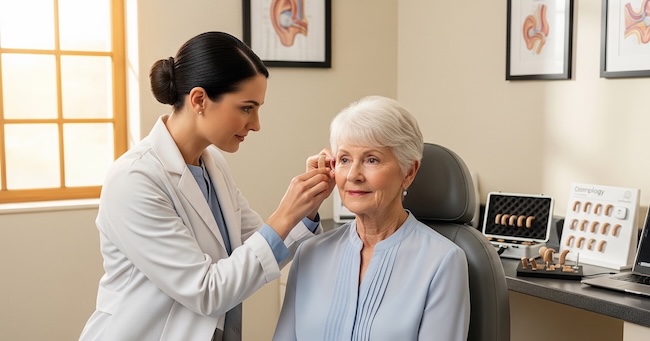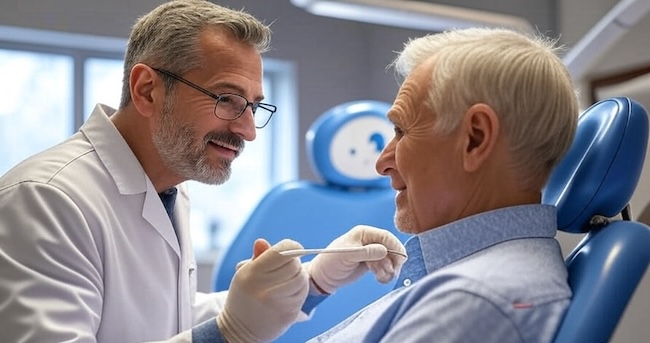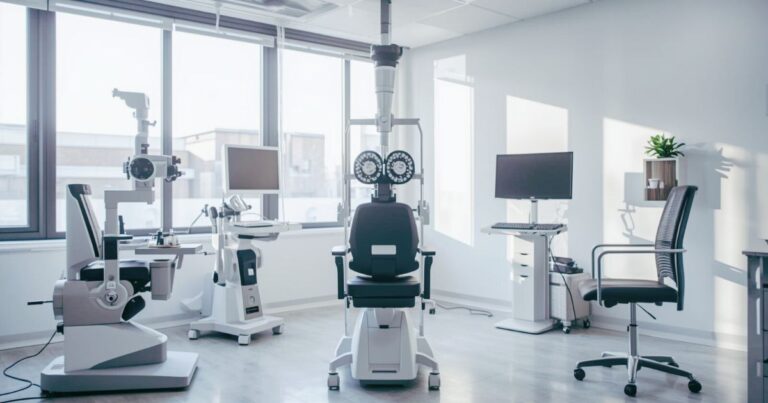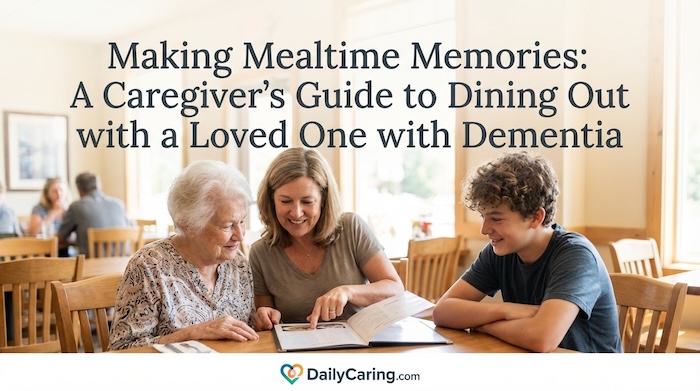As a family caregiver, you’re on the front lines of protecting your parent’s health and well-being. You likely know about the importance of a heart-healthy diet and physical activity. But groundbreaking new research has uncovered two surprising, yet influential, factors in the fight against cognitive decline: oral health and hearing health.
Scientists are now finding that taking care of your parents’ teeth and addressing hearing loss aren't just about a bright smile or following conversations; they could be crucial steps in reducing their risk of developing dementia.
Let’s break down the science and the alleged link between hearing loss and dementia, oral health and dementia – and, most importantly, what you can do about it!
The Hearing Loss and Dementia Connection

It’s well-known that hearing loss becomes more common as we age. What’s less known is its strong correlation with cognitive decline. Major studies, including those from the Lancet Commission on Dementia Prevention, Intervention, and Care, have identified hearing loss as the most significant modifiable risk factor for developing dementia, potentially accounting for more risk than hypertension or obesity!
How are they connected? Researchers have three main theories:
- Cognitive Load: When the brain is constantly straining to hear and decode sounds, it overworks itself. This excess effort can come at the expense of other cognitive functions, such as memory and thinking.
- Brain Changes: Hearing loss can lead to accelerated atrophy (shrinkage) of the brain, particularly in the regions responsible for processing sound and language, which are also vital for memory.
- Social Isolation: Struggling to hear can lead to withdrawal from conversations and social activities. This isolation is a known risk factor for cognitive decline and depression.
The good news? A landmark 2023 study published in The Lancet found that using hearing aids could reduce the risk of cognitive decline by up to 48% over a 3-year period. This suggests that treating hearing loss isn't just about better hearing-it's also about protecting the brain.
The Oral Health and Dementia Connection

You might be wondering what the health of your one's mouth has to do with their brain. The link, as it turns out, is inflammation.
The primary culprit is periodontitis, a severe gum disease caused by bacterial infection. When gums are inflamed and bleed, these bacteria can enter the bloodstream.
Here’s what researchers believe happens next:
- Systemic Inflammation: The bacteria from the mouth trigger an inflammatory response throughout the body. Chronic inflammation is a known enemy of brain health and is believed to damage neurons.
- Direct Brain Effects: Some studies have found the bacteria associated with gum disease (Porphyromonas gingivalis) in the brains of individuals with Alzheimer's. It's theorized these bacteria may directly contribute to the formation of amyloid plaques, a hallmark of the disease.
An extensive 2023 study following 18,930 people found that patients who received periodontal emergency treatment within 3 years had a significantly increased risk of dementia. Furthermore, a meta-analysis cited in the National Library of Medicine noted that “Poor periodontal health may increase the risk of both cognitive decline and dementia.”.
VIDEO: The Surprising Link Between Oral Health, Hearing, and Dementia
A Powerful Opportunity for Dementia Risk Prevention
Individually, these links are compelling. Together, they represent a powerful, two-pronged strategy for caregivers. Addressing both hearing and oral health tackles two significant sources of cognitive risk: social isolation and chronic inflammation.
By helping your parent manage these areas, you’re not just improving their daily quality of life, you’re actively contributing to their long-term brain health and helping to build cognitive resilience.
Actionable Tips for Caregivers
This news isn't meant to alarm you, but to empower you! Here are practical steps that caregivers can take to minimize the risk that hearing health and oral health can have on dementia risk:
Strategies For Protecting Hearing Health:
- Encourage a Hearing Test: This is the first and most critical step. Frame it positively: “Let's see if a hearing aid could make it easier for you to enjoy conversations with the grandkids.”
- Discuss Hearing Aids: If recommended, help them choose, get fitted, and consistently use their hearing aids. Modern devices are discreet and effective.
- Reduce Background Noise: During conversations, turn off the TV or radio to make listening easier.
- Speak Clearly: Face your parent when you speak, and don’t shout. Speak clearly at a moderate pace.
Strategies For Protecting Oral Health:
- Simplify the Routine: Use an electric toothbrush for more effective cleaning. Learn how to help someone with dementia brush their teeth. Help them floss with easy-to-use floss picks or a water flosser if they have difficulty flossing.
- Schedule Regular Dental Checkups: Aim for cleanings and checkups every six months. Inform the dentist that you are caring for an older adult and discuss any specific concerns.
- Watch for Warning Signs: Look for red, swollen, or bleeding gums, loose teeth, or complaints of pain. These are signs to see a dentist immediately.
- Stay Hydrated: A dry mouth can increase the risk of cavities and gum disease. Ensure they drink plenty of water and discuss dry mouth treatments with their doctor or dentist.
The Bottom Line for Caregivers
While there are no proven ways to prevent dementia entirely, the evidence is clear: Managing hearing and oral health are among the most significant actionable steps we can take.
By prioritizing these often-overlooked aspects of health, you are doing far more than preserving a smile or making conversations easier. You are actively investing in your loved one’s cognitive future, giving them the best possible chance to stay healthy, engaged, and sharp for years to come.
About the Author

Chris is a seasoned healthcare executive and entrepreneur from the Pacific Northwest. He strongly advocates for older adults and the caregivers who serve them. Chris has personal experience caring for his father, who had dementia. Chris is an avid outdoorsman; if he's not in his office, he can usually be found on a golf course or in a garden out west somewhere.













